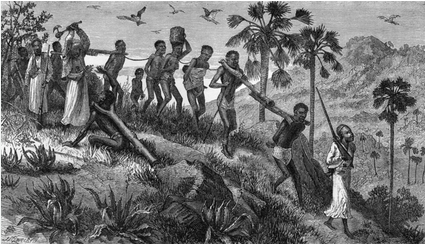
support@yorubalibrary.com
+2348073529208, 07038599574

Do you know why Yoruba says "Ida ni o pe ara re l'eru, o n fewo ni o pe ara re l'ole; eniyan ti a gbe ge-ge-ge ni o ba ara re je"? What is the story behind this expression? In today's post, we will detail the story behind what bring about this proverb in Yoruba Land.
THE STORY
Once upon a time, there was a King in old Oyo Empire named "Ajalorun". The King was renowned for his wisdom, generosity and hospitality. In short, the great old Oyo empire witnessed many peace all round during his reign. King Ajalorun was very wealthy and well-to-do in the society. In the olden days, slave trade (Owo Eru) was very rampant, and King Ajalorun bought many slaves with his money; they all dwell peacefully and well-fed. King Ajalorun doesn't segregate Slave from the Real Child.
Due to his hospitable nature, he specially liked one of his Slaves called "Ida". Ida has no special character that differentiate him from the rest of slaves. However, he found favour in the sight of the King. Whatever King Ajalorun buys, he will buy that of Ida as well. Whenever King has something bothering him, he will consult Ida for advice. If King Ajalorun eats, he will invite Ida to dine and wine with him. Gradually, the slave is turning to a real child (Eru ti n d'omo). In a short while, King Ajalorun and Ida became a great companion, they go everywhere together. Whatever respect that is due for the King is also bestowed upon Ida. This made Ida (the then slave) to be very popular in the Old Oyo Empire. His status and position have changed, he wears good clothes, has royal beads on his neck, has access to the King Ajalorun horses and many more.
One day, the then Alaafin of Oyo popularly referred to as “Iku Baba Yeye” has a special feast with neighbouring Kings of the old Oyo Empire - Ipade Loba-Loba. King Ajalorun was also invited to the feast. It was such an elaborate even that everyone wanted to be there. King Ajalorun assembled his entourage and his special friend - Ida. He wore him a good fabric, gave him one of his most cherished beads. Infact, Ida's appearance was almost like that of King Ajalorun. They all set to go for this great feast.
One reaching there, there were different Kings. Ida was opportune to see faces of different Kings this very day. He was marveled. Later, the programme got to the entertainment part, there were varieties of foods and drinks; it is serve yourselves party – Pounded yam with Egusi, Amala and Gbegiri, Efo-Riro, Asaro, Bush Meats, Burukutu, Moin-Moin, Akara etc Everything was assorted and in abundance. Each of the King wine and dine to satisfactions. Ida was not left out; he ate to the fullest. He was satisfied to the core.
It is worthy to note that pounded remain one of the best Yoruba dishes till these days and mostly served in elaborate and influential events only. Unlike this new age that we peel yams before cooking; Yoruba people of olden days don’t peel yams before cooking. instead, when Yoruba wants to prepare pounded yam, they will first cook the yam with its peels. After it is well cooked and ready to be pounded, that is when they will start peeling it and throwing the peeled yam into the mortal for pounding while still hot. This process ensures that yam retains its nutritional value and tough during pounding.
After a while, Ida told the King Ajalorun he would like to urinate. So, he excused himself from the gathering. As he was passing by, he saw the kitchen where the food was prepared. He saw a large yam peels (Eepo Isu) with little yams left over on them. He couldn’t control himself; he looked around to ensure no one is looking as all women have left the kitchen to witness the event in the main auditorium. He sat beside those peels, and started eating those little yams from the peels (Ida n ti eepo isu je). He was busy doing this, when woman a entered. He saw Ida with his King-like attire and she screamed… Ara Ile oooo (Everyone), Omo Oba ti n ti eepo isu je…. (The prince is eating the yam peels).
Everyone rushed in, including King Ajalorun. When he saw him, he was ashamed. People started shouting “Omo Oba N Je Eepo Isu” (The Prince is eating yam peels). Immediate, King Ajalorun changed the tone, he said “He is not my son, but my slave”. The King ordered them to strip him of attire and all numerous accessories he wore. They gave him tattered clothes… He was ashamed.
Because of greed and inability to control urge, Ida relegated his status from King Ajalorun bossom friend, and became a mere slave. Even though, the King Ajalorun presented him as a prince, yet the characters of slave never left Ida. After a few months, Ida later died. This is why Yoruba says, "Ida ni o pe ara re l'eru, o n fewo ni o pe ara re l'ole; eniyan ti a gbe ge-ge-ge ni o ba ara re je".
What does this story teach you? Use the comment section below

Learn about the Yoruba concept of Ìwà Pẹ̀lẹ́ (good…

Learn special praises for Divine Being and Creator…